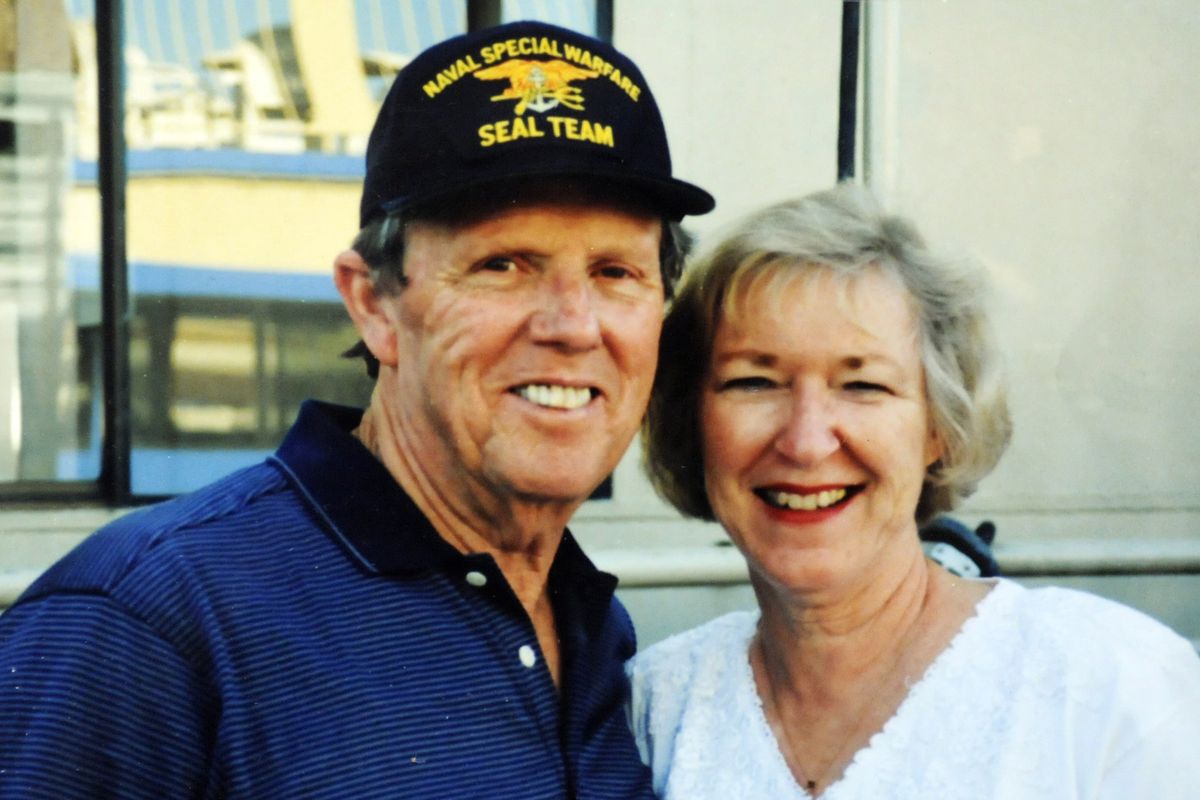Love amid challenges of Alzheimer’s disease

A former Navy Seal, he earned a master’s degree in education. And nine years ago, at age 63, still trim and fit, he found the love of his life. But now, he’s in a wheelchair and needs help feeding himself. His eyes still light up when he sees his wife, but when asked her name, he rubs his face with his hands and slowly shakes his head.
Sonny Thrush is near the end of his long goodbye.
For Elaine Thrush, Alzheimer’s disease has become a cruel coda to a love story that took almost 50 years to begin. “We attended North Central High School together in the ’50’s,” she said. “Everybody loved Sonny.”
She described him as a handsome, outgoing young man who’d had a difficult upbringing. His father had abandoned him, and Sonny worked at the Davenport Hotel and lived at the YMCA while attending high school.
Sonny and Elaine lost touch when he joined the Navy after graduation, but in 1969 they met again. “I was handing out name tags at a PTA meeting in San Diego, when Sonny and his wife walked in,” said Elaine. The former classmates discovered they lived just blocks apart and their children attended the same school.
When Elaine and her husband moved to Canada, she and Sonny lost touch again. But in 2000 Sonny found her through Classmates.com. “He was divorced and I was recently separated,” recalled Elaine. She’d returned to Spokane, and they began an e-mail correspondence which evolved into frequent phone calls.
An all-school reunion that summer gave the couple a perfect way to reconnect. “Something just sparked between us,” said Elaine. Sonny moved from San Diego to Spokane, and on Feb. 18, 2001, they married.
A few months later, Elaine noticed Sonny had difficulty keeping track of his keys. He’d set them down and minutes later had no recollection of where he’d put them. He grew increasingly frustrated by his forgetfulness.
“His mother and aunt had Alzheimer’s,” said Elaine. “I knew I had to get him to a doctor.”
And before they celebrated their first anniversary, Sonny was diagnosed with the disease.
He certainly isn’t alone. According to Joel Loiacono, executive director of the Inland Northwest Chapter of the Alzheimer’s Association, every 70 seconds someone in the United States develops the disease. In addition, “the symptoms are much more profound than memory loss,” he said.
Elaine found valuable help and information through the Alzheimer’s Association. “I needed to know what comes next,” she said.
The group provides a host of education and support services. Loiacono said, “We’re advocates for people with Alzheimer’s and their caregivers.” That assistance to caregivers can be crucial. In fact, Loiacono said that they lose 40 percent of their caregivers to death or debilitating illness before they lose their Alzheimer’s patients.
That was almost the case for the Thrushes. Sonny’s illness soon took a backseat to Elaine’s health issues. “I was diagnosed with breast cancer,” she said. Other concerns added to her distress. Within five years, she lost her son, father, brother and brother-in-law.
Her husband rallied to become her strongest support. When Elaine had to be at the hospital every morning for radiation therapy, Sonny accompanied her. “He wanted to be with me. He wanted to hold my hand, and he did,” she said.
As she recalled those dark days and Sonny’s unwavering presence, her eyes filled with tears. “He loved me so much,” she said. “But I got well and he got sicker.”
His mental confusion worsened. He would often go to get the mail at the end of their cul-de-sac and become disoriented and end up at a neighbor’s home.
In 2008, while visiting friends on Lake Coeur d’Alene, Sonny wandered off. It took several hours for law enforcement personnel to find him. He’d lost his glasses and shoes, and he sported bloody scratches. Two days later, he wandered off again.
“That’s when I knew he needed to go into care,” said Elaine.
That decision is wrenching for most caregivers and Elaine was no exception. “It was difficult because I knew he wouldn’t be coming home again.”
On a recent afternoon, she visited her husband at Good Samaritan Society in Spokane Valley. Though he hasn’t recognized her for the past eight months, Sonny’s face lit up when he saw her. “Well, hi!” he said. She leaned over and kissed his forehead.
“It’s like the Abba song Winner Takes it All – Alzheimer’s takes it all,” said Elaine. “Everything is gone except his beautiful smile.”
When he moved into the nursing home he still knew her and would beg her to take him home. “I’d sit in my car and cry,” she recalled. “I miss him so much. Even when he doesn’t know me – I know him. I know how much I loved him and how much he loved me.”
Now, she visits a couple of times a week and feeds him his lunch. She feels fortunate to have a network of friends and a sister to offer her support. But dealing with so many losses has taken its toll. As she and a visitor left a conference room, they discovered Sonny sitting just outside the door. He smiled and his eyes sparkled. He reached a trembling hand toward her face. “You’re all I have,” he said. “You’re my everything.” She kissed him and asked, “Do you know who I am?”
His smile dimmed. His eyes clouded. He slowly shook his head.
“I’m your Lainie,” she said, holding his hand.
“Oh,” Sonny said. “I haven’t seen you in forever.” And once again he smiled. “I love you,” he said.